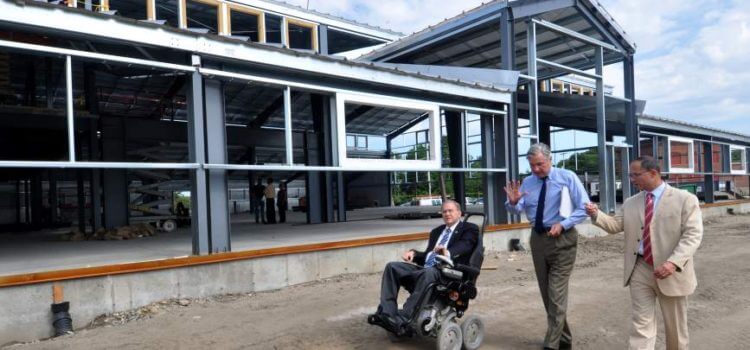By Dale P. Faulkner – Sun staff writer
The two Democrats, Sen. Sheldon Whitehouse and 2nd District Rep. James Langevin, started on Railroad Avenue, where the Westerly Higher Education and Job Skills Center is under construction. They then moved to Westerly Hospital, where they learned about a proposed collaboration between the hospital and Wood River Health Services. A tour of the South County Health Medical and Wellness Center, near Dunn’s Corners, followed.
While Electric Boat will serve as the initial anchor tenant of the education and jobs skills center, the facility will offer training opportunities related to other endeavors. James Purcell, state commissioner of postsecondary education, said medical coding and related training is likely to be offered eventually, as well as more generalized computer classes. “We want to address the health care worker shortage,” he said.
In some cases, Purcell said, the center will serve as an intermediary step between high school and the workforce.
“I think it’s going to create a community of workers,” he said.
John P. Casey, executive vice president of Electric Boat’s Marine Systems group, said finding trained workers is critical to the company’s ability to meet the demands of a contract with the U.S. Navy that calls for the construction of 10 Virginia-class attack submarines by 2023. About 3,000 additional workers will eventually be needed at the company’s Quonset Point location.
Joining the tour were other Electric Boat officials, state Sen. Dennis Algiere, R-Westerly, and state Rep. Sam Azzinaro, D-Westerly.
Charles Royce, whose Royce Family Fund contributed $1.7 million toward the estimated $4.5 million cost of the project, said offering a range of training opportunities will sustain the center.
“There’s a little bit of ‘build it and they will come,’ but because we’ve created it to be multipurpose and we do use other institutions, I think we’ve created the right mix,” Royce said.
The state Office of the Post-Secondary Commissioner will lease the facility from the Royce fund.
The center is expected to partially open in mid-November. The Community College of Rhode Island is working with Electric Boat to develop a curriculum for students. The University of Rhode Island and Rhode Island College are expected to use the facility as well.
Bruce Cummings, L+M Healthcare president and chief executive officer, said he had instructed his staff to work with Amy Grzybowski, the center’s executive director, to match the hospital’s need for employee training with services the center might be able to offer.
Electric Boat is expected to use 14,500 square feet of classroom space, but another 20,000 square feet will be available for other uses.
At Westerly Hospital, Langevin and Whitehouse received a briefing on an application filed with the federal Health Resources Services Administration for $900,000 to establish a satellite office of Wood River Health Facilities at Westerly Hospital. If approved, the Hope Valley-based health center would offer urgent care, primary care, and behavioral health services at the hospital. The services are planned for the hospital’s former Women’s Health Center, which closed in 2013 when L+M Healthcare purchased Westerly Hospital.
Patients are more likely to make use of behavioral-health services when they are integrated along with other medical services, said Michael Lichtenstein, Wood River Health Services president and chief executive officer.
Westerly Hospital and the health center have a longstanding collaborative relationship, Cummings said. Many of the center’s doctors are on the hospital’s medical staff. The proposal is similar to L+M’s Connecticut physicians’ group offices, which offer behavioral-health services, Cummings said. “Our physicians find this to be extremely valuable,” he said, adding that studies show about 40 percent of patients seeking medical care are also in need of behavioral health care.
Whitehouse said he periodically spends an evening in the emergency department at Rhode Island Hospital to get an on-the-ground understanding of health-care issues. He said he has often seen police accompany ambulances carrying patients who are need of medical and behavioral health care.
The two-story, 30,000-square-foot South County Health medical center offers a range of services under one roof, including urgent and walk-in care, primary care, women’s health services, ob/gyn, 3D mammography, X-ray services, ultrasound and cardiology. Most of the services are provided by doctors, nurses and other providers who work under the South County Health system umbrella, which includes South County Hospital in Wakefield. Bryan Liese, the system’s physician practice administrator, and Lou Giancola, South County Health president and chief executive officer, gave Whitehouse and Langevin a tour of the facility.
“We’re bringing these groups of providers together in an effort to coordinate care,” Liese said.
Dr. James McCormick said he has gained about eight new patients per week since the facility opened in May. Overall, Liese said, new patients have so far made up about 50 percent of the patient pool seen by the specialists who practice at the center. “There is definitely a demand in the community, so we are happy we are here,” Liese said.
Langevin said the center is an example of what legislators hoped would develop as a result of federal health-care reform efforts.
“Ultimately the hope is better care and lower costs in the long run,” Langevin said.








